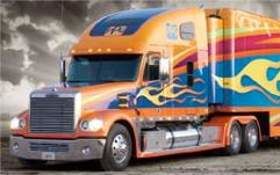Are Trucking Companies Switching To Automatic Transmissions?
Topic 4925 | Page 2

I'm sorry, but give me a thirteen speed any day, I learnt on them and drove them, and loved the tranny, Yes especially in the Northeast. If I remember correctly? If you take your test in an auto you are licensed for an auto and not a Manual.?

I'm sorry, but give me a thirteen speed any day, I learnt on them and drove them, and loved the tranny, Yes especially in the Northeast. If I remember correctly? If you take your test in an auto you are licensed for an auto and not a Manual.?
That is correct as I understand it. If you take your CDL test using an automatic then you can only drive automatics. But if you take it in a manual you can drive both.
CDL:
Commercial Driver's License (CDL)
A CDL is required to drive any of the following vehicles:
- Any combination of vehicles with a gross combined weight rating (GCWR) of 26,001 or more pounds, providing the gross vehicle weight rating (GVWR) of the vehicle being towed is in excess of 10,000 pounds.
- Any single vehicle with a GVWR of 26,001 or more pounds, or any such vehicle towing another not in excess of 10,000 pounds.
- Any vehicle, regardless of size, designed to transport 16 or more persons, including the driver.
- Any vehicle required by federal regulations to be placarded while transporting hazardous materials.

I hope you guys are right. I read that between the new volvo auto trans, and the freightliner trans, the volvo is superior. It's supposedly the best auto out there. Can anyone confirm this?

In Europe some drivers complain that they just turn into mere machine operators.
I hope you guys are right. I read that between the new volvo auto trans, and the freightliner trans, the volvo is superior. It's supposedly the best auto out there. Can anyone confirm this?
Volvo auto-shift trans rock - I drove a friends, as smooth as my Honda Pilot.
Only problem is they can only be paired with a Volvo ENGINE. Volvo parts availability has gotten better (but dealers are close on weekends) - but - you will sit far less waiting for a Cummins/Eaton auto-shift parts, than a Volvo/Volvo combination.
I've been driving stick since I've had a drivers license (38 years), and the first time I got into a truck - totally different animal. If you'r still in school - stick with getting double-clutching down, as you can't "float gears" on your road test.
Rick
Float Gears:
An expression used to describe someone who is shifting gears without using the clutch at all. Drivers are taught to "Double Clutch" or press and release the clutch twice for each gear shift. If you're floating gears it means you're simply shifting without using the clutch at all.
Talk about the industry moving to autos became all the rage about 10-15 years ago and several companies moved toward them in a big way. US Xpress was one of the first companies to go "all in" and have had an automatic fleet for a very long time. But in recent years even they are switching back to standards because autos have been too expensive to install and maintain, and they've also been too unreliable.
But now there are far more people getting into the game on the building and development side. If someone can figure out how to make them economically feasible it's going to be a rush for every large company to get them because the fuel mileage will be quite a bit better. And that's their number one cost.
So in the short term - maybe the next 5 years - not much will change. Trucking companies will continue to test them and a few will move toward them, a few will move away. If anyone figures out how to make them economically feasible you will see a rush toward them that will take about 5 years to play out as fleets begin to order them in new trucks.
As far as the driving aspect - they're a dream to drive. I drove one for almost 6 years at US Xpress. The only complaint I had was reliability. It would break down and leave you stranded about twice a year and it took a while to fix because not many people were qualified. But as far as driving - no complaints. They're great.
The remark about taking the skill level away from trucking - not true really. I mean, when you look at the endless array of challenges you face out there, shifting is not really one of them. Sure, maybe for a few months.....but then it becomes second nature.
A lot of people feel they don't have the control with an automatic but that's not true either. You can shift it manually anytime you like and you can lock it in a gear anytime you like. So the mountains are no problem. You're not taking control away from the driver. You're simply eliminating some unnecessary work.
TWIC:
Transportation Worker Identification Credential
Truck drivers who regularly pick up from or deliver to the shipping ports will often be required to carry a TWIC card.
Your TWIC is a tamper-resistant biometric card which acts as both your identification in secure areas, as well as an indicator of you having passed the necessary security clearance. TWIC cards are valid for five years. The issuance of TWIC cards is overseen by the Transportation Security Administration and the Department of Homeland Security.

I hope you guys are right. I read that between the new volvo auto trans, and the freightliner trans, the volvo is superior. It's supposedly the best auto out there. Can anyone confirm this?
Volvo auto-shift trans rock - I drove a friends, as smooth as my Honda Pilot.
Only problem is they can only be paired with a Volvo ENGINE. Volvo parts availability has gotten better (but dealers are close on weekends) - but - you will sit far less waiting for a Cummins/Eaton auto-shift parts, than a Volvo/Volvo combination.
I've been driving stick since I've had a drivers license (38 years), and the first time I got into a truck - totally different animal. If you'r still in school - stick with getting double-clutching down, as you can't "float gears" on your road test.
Rick
I was told by an instructor that I can float the gears. Regardless, I like to double clutch so I don't really care.
Float Gears:
An expression used to describe someone who is shifting gears without using the clutch at all. Drivers are taught to "Double Clutch" or press and release the clutch twice for each gear shift. If you're floating gears it means you're simply shifting without using the clutch at all.
Float The Gears:
An expression used to describe someone who is shifting gears without using the clutch at all. Drivers are taught to "Double Clutch" or press and release the clutch twice for each gear shift. If you're floating gears it means you're simply shifting without using the clutch at all.
Double Clutch:
To engage and then disengage the clutch twice for every gear change.
When double clutching you will push in the clutch, take the gearshift out of gear, release the clutch, press the clutch in again, shift the gearshift into the next gear, then release the clutch.
This is done on standard transmissions which do not have synchronizers in them, like those found in almost all Class A trucks.

Talk about the industry moving to autos became all the rage about 10-15 years ago and several companies moved toward them in a big way. US Xpress was one of the first companies to go "all in" and have had an automatic fleet for a very long time. But in recent years even they are switching back to standards because autos have been too expensive to install and maintain, and they've also been too unreliable.
But now there are far more people getting into the game on the building and development side. If someone can figure out how to make them economically feasible it's going to be a rush for every large company to get them because the fuel mileage will be quite a bit better. And that's their number one cost.
So in the short term - maybe the next 5 years - not much will change. Trucking companies will continue to test them and a few will move toward them, a few will move away. If anyone figures out how to make them economically feasible you will see a rush toward them that will take about 5 years to play out as fleets begin to order them in new trucks.
As far as the driving aspect - they're a dream to drive. I drove one for almost 6 years at US Xpress. The only complaint I had was reliability. It would break down and leave you stranded about twice a year and it took a while to fix because not many people were qualified. But as far as driving - no complaints. They're great.
The remark about taking the skill level away from trucking - not true really. I mean, when you look at the endless array of challenges you face out there, shifting is not really one of them. Sure, maybe for a few months.....but then it becomes second nature.
A lot of people feel they don't have the control with an automatic but that's not true either. You can shift it manually anytime you like and you can lock it in a gear anytime you like. So the mountains are no problem. You're not taking control away from the driver. You're simply eliminating some unnecessary work.
Good stuff.
TWIC:
Transportation Worker Identification Credential
Truck drivers who regularly pick up from or deliver to the shipping ports will often be required to carry a TWIC card.
Your TWIC is a tamper-resistant biometric card which acts as both your identification in secure areas, as well as an indicator of you having passed the necessary security clearance. TWIC cards are valid for five years. The issuance of TWIC cards is overseen by the Transportation Security Administration and the Department of Homeland Security.
One of the things you have to realize about these auto transmissions is that they are not anything comparable to the auto transmissions in an automobile. They are actual gear boxes with a clutching mechanism, but they are controlled by a sophisticated computer program to get the maximum efficiency for things like torque and fuel economy. While a car's automatic tranny is basically fluid being forced under pressure to "transmit" the engines power to the drive wheels, the "automatic" trucks are still using gears, only the computer switches them at precisely the best time for what is needed for the driving needs and conditions at hand.
New Reply:
New! Check out our help videos for a better understanding of our forum features

















Preview:
This topic has the following tags:
Automatic Transmissions Safe Driving Tips Tips For Shifting Tips For Shifting Truck Equipment Questions







 TT On Facebook
TT On Facebook
Right now my company only has one auto but we plan on getting more. We're averaging close to a 3mpg difference between that and the manuals. So over the long term they will end up saving a ton. Of course on the other hand I drive for a very small company who leases the tractors so maintaining them isn't so much a big problem. I couldn't picture the huge national companies going to mostly autos though.